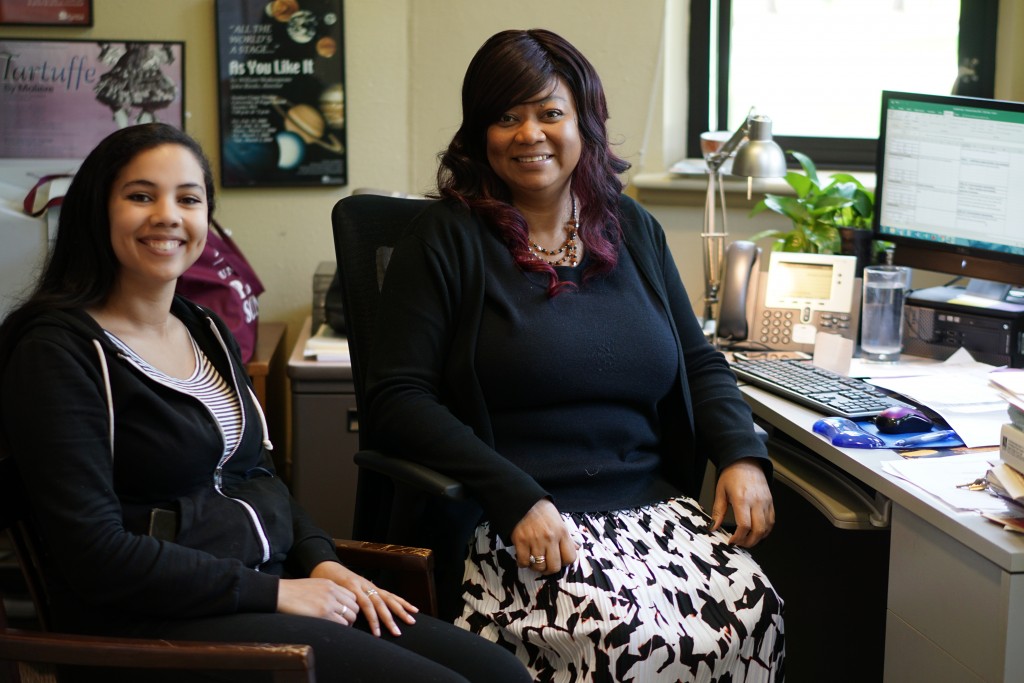Michelle Lai Fook ’01 claims to have learned valuable time-management skills during her stint as a student staff member at Puget Sound. And when you see her email signature line, it’s clear that those are skills she continues to use to this day. Michelle splits her time between the Department of Theatre Arts, the Gender & Queer Studies Program, and the Environmental Policy & Decision Making Program.
Michelle took time out of her hectic work schedule to chat with Mary Ferriera-Wallace ’17 about working at Puget Sound—as a student, and beyond.

Mary: When you were a student at Puget Sound, what on-campus jobs did you hold?
Michelle: I think I should give some backstory. I was an international student, which is kind of rare, because I was the only student from Trinidad and Tobago—and I still am!
Just how I got to be a student here was almost miraculous. I was a student at TCC and I used to come here to study. I met a professor who asked, “would you like to attend Puget Sound?” and I was like, “YES!”
My first student job on campus was in Facility Services, and I did all kinds of stuff like office reception, administration, and inventory. I really enjoyed my time working there. I worked twenty hours a week and was a full-time student. I had scholarships, so I had to maintain a certain GPA while working 20 hours a week.
I think what I really learned was time management. In my jobs after I graduated I was really good at time management because I’d already been trained to be efficient, dependable, and reliable.
Mary: Does your experience as a student staff member influence how you approach your current role as a supervisor?
Michelle: Yes! I think that my supervisors saw my potential and allowed me to do different tasks that would really give me a skill.
They would give me more responsibilities in case they weren’t there—things like inventory where you have to be really accurate. Sometimes the jobs were a little boring, but that helps you gain patience. And sometimes you want to do everything really fast, but you learn to take your time and do things accurately.
In on-campus jobs, I really learned what I like to do. The best thing about those experiences is learning what you like, what you are good at, and feeling appreciated by your supervisors.
My supervisors saw my potential and they let me do things that I wanted to do that would expand my skill set. So that is what I want to do for my students. That’s how I’m giving back.
I have a student who is going to be Communication major. I’ve worked in communications and I know that you need to know how to plan events and use graphic art software. So I’ve gradually asked her to do tasks that would give her the skills she’ll need to have on her resume. She does posters, flyers, invitations, graphic design…all kinds of stuff. I told her to look for a course she could take to learn how to use a Mac, because depending on where she is working, she will need to know how. I wanted her to learn these things so she would have real marketable skills for the real world.
Mary: I’ve been offered a job here on campus for after I graduate, and I think your perspective on what that transition is like is really valuable since you were a student here too. Everyone is asking me if I think that what I learned as a student staff member will prepare me for my next job, and I really think it will! I’m interested in hearing your thoughts on how the skills you learned when you were a student translate into your job now.
Michelle: Once you prove that you’re dependable and willing to learn, people are willing to take the time to train you. Everyone does things differently, so you get to learn how to do things in a new way—to work with people and learn as much as you can. It really helps to learn skills that you can put on your resume, and there will always be people who can teach you new things.
Plus, everything you’re doing right now is going to help you wherever you go next. Something about what you’re doing now is valuable…even filing will teach you accuracy and patience.
If you know what kind of job your degree will get you or understand the work you’ll be doing, you can aim for jobs that build the skills you need. Having the opportunity to practice the necessary skills while you’re still in school is really important. Having work experience gives you an advantage.
Mary: What advice would you offer to students about how to make the most of their on-campus jobs?
Michelle: If there is something you are interested in, or new skills that you want to learn, don’t be afraid to ask your supervisor. Also be dependable, be reliable, go the extra mile. These things stand out. If you practice these skills now, they will be automatic when you get out in the real world.
© 2017 Career and Employment Services, University of Puget Sound
Photos by Jacob Pogorek ’20